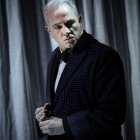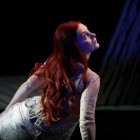Rusalka 2016Scottish Opera
Read more about the opera Rusalka
After a brief appearance at the Edinburgh International Festival, with an enjoyable concert performance of H M S Pinafore, Scottish Opera's 2015-16 season proper began with a revival of the staging of Carmen by Patrice Caurier and Moshe Leiser. This was first put on by Welsh National Opera, and was mounted by Scottish Opera in 1999. This ran in tandem with a new small-scale tour of Così fan tutte. In the New Year the premiere of a new work by Stuart MacRae, The Devil Inside, was followed by three further operas being given by the company for the first time - Ariodante, Rusalka and The Mikado.
The arrival of Scottish Opera's Rusalka was eagerly awaited. It was over half a century since the Czechs brought a staging of the opera to the 1964 Edinburgh Festival. The neglect of this beautiful work is hard to fathom, but it seems to have caught on slowly down south. David Pountney first mounted it in the eighties at ENO with great success. More recently, both Glyndebourne and Covent Garden have done well by the piece. A less heralded production was given in 2008 at Grange Park, and this is the version that Scottish Opera have deservedly brought north. The result is a complete success, greeted with justifiable rapture by the first-night audience.
Because of its long-term importance for the company, first credit must go to new music director Stuart Stratford. The sounds coming from the pit were glorious from the opening bars. The orchestra sounded as though they had been playing this unfamiliar music for years, and it was all thoroughly idiomatic. There are references to Wagner for the water music, to Humperdinck for the witch and to the Russians for the second act 'foreign' themes. But the closest links were, of course, to the composer's own late tone poems based on lurid and gruesome folk tales - The Water Goblin, Noon Witch, Golden Spinning Wheel and Wild Dove. Perhaps the only weakness was the too-distant sound of the offstage chorus - lovely, but near-inaudible.
The quality of this cast was very promising indeed, led by Anne Sophie Duprels and Peter Wedd. They have both shown themselves at home in the Czech idiom and this work continued the process. There was never anything that was less than beautiful. Sir Willard White, as Rusalka's father, used to appear here regularly, and it was very good to hear him again in an area of the repertoire he has sung frequently elsewhere, but never before in Scotland. His goblin never forfeited sympathy - after all, the humans are really the villains in this piece.
Leah-Marian Jones is another popular guest. Her witch clearly brought some elements over from her recent Hansel and Gretel, but also owed much to the other fierce matrons in Czech opera. Even so, she projected elements of character that were unexpected. Having chopped off Rusalka's tail so viciously in the first act, it was surprising to see a sense of resigned long-suffering, almost regret, as she was proved right in the third. First time visitor Natalya Romaniw made a very strong impact as the rival princess, poised, arrogant and confident - thoroughly accustomed to getting her own way.
The smaller roles were also impressive. The three Rhinemaiden-clones sang beautifully and created lively characters, much helped by the presence of three silent dancers, identically costumed to increase their impact. Further apt comedy was provided by Clare Presland (Kitchen Boy) and Julian Hubbard (doubling as Gamekeeper and off-stage huntsman).
Antony McDonald is an intelligent director/designer, with a generally good record, and his work had not been seen here for a while. The sets and costumes were elegant, with effective and literal depictions of lake and woodland, all beautifully lit. As expected, he made us think about this work, which clearly has hidden depths. There were lots of clever touches - Rusalka without her flippers clearly walking very awkwardly - a fish out of water, never beginning to look at ease except when the servants put her into the bath before dinner. The party guests all supremely elegant tucking into the banquet. And constant references to fish, even the shape of the ball-gowns.
A thoroughly rewarding and enjoyable evening, not to be missed.
Performance Cast
- First Dryad
- Second Dryad
- Third Dryad
- Vodník a water goblin, Rusalka's father
- Rusalka a naiad, daughter of the water goblin
- Ježibaba a witch
- Prince
- Gamekeeper Hajný
- Kitchen Boy Kuchtík
- Foreign Princess











